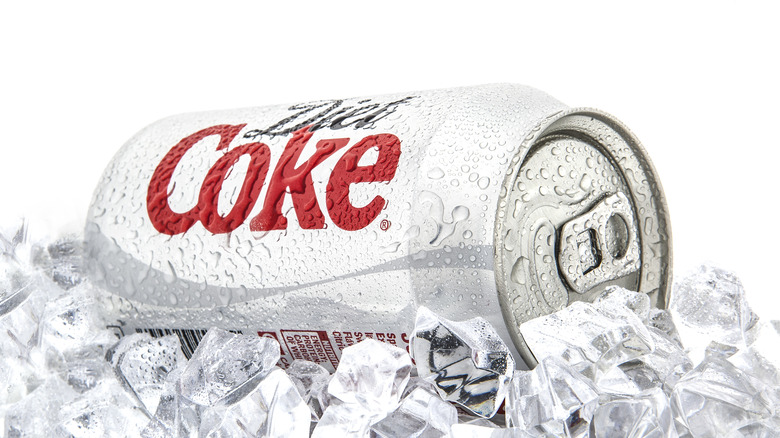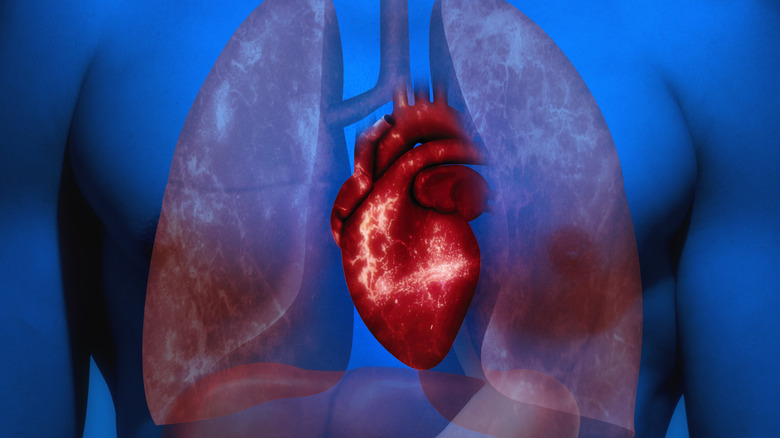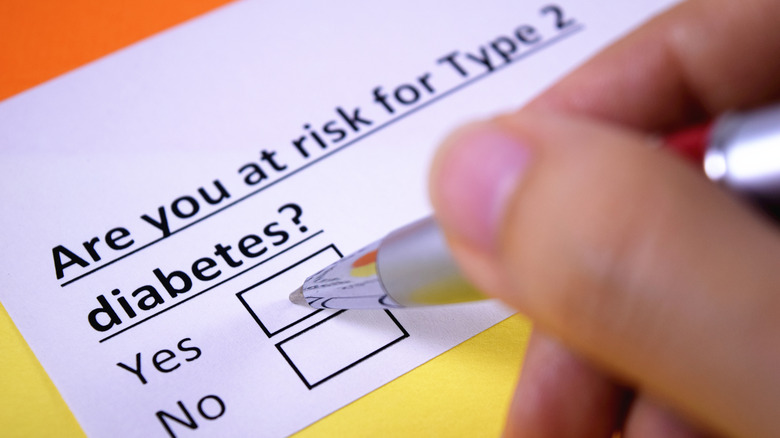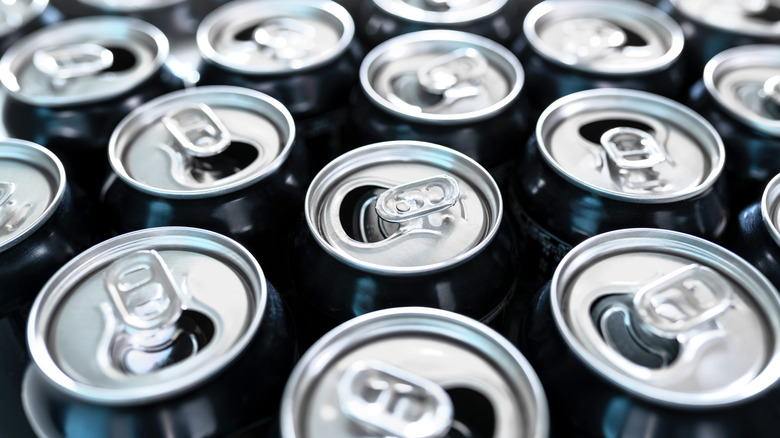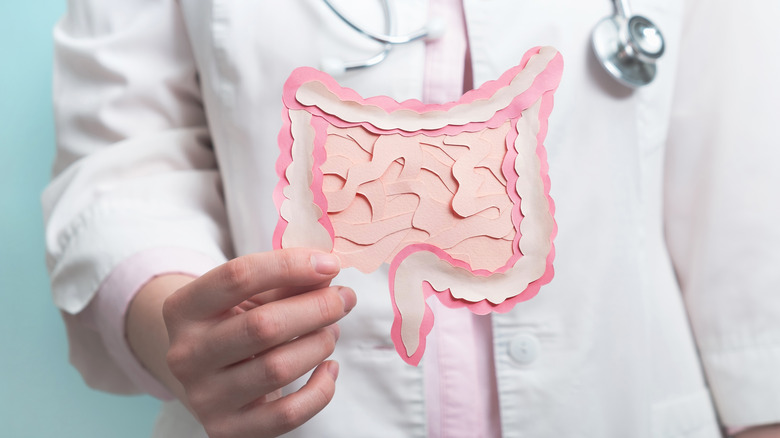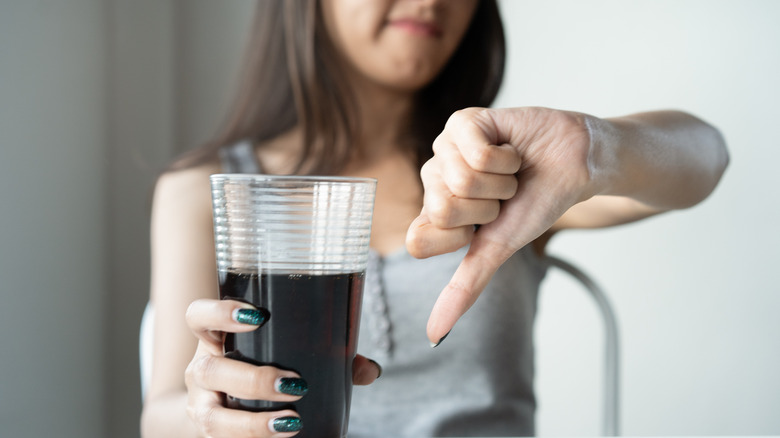What Happens To Your Body When You Drink Diet Coke Every Day
You don't have to look far to find studies that say artificially sweetened sodas are bad for you, and that the negatives outweigh the positives about Diet Coke or any other zero-calorie soda. Not only are these diet beverages bereft of nutritional value, but studies have also repeatedly pointed to them being harmful to your health if consumed daily.
Purdue University researchers reviewed dozens of studies on diet sodas and health outcomes in 2013. According to their report, "accumulating evidence suggests that frequent consumers of these sugar substitutes may also be at increased risk of excessive weight gain, metabolic syndrome, type 2 diabetes, and cardiovascular disease." The report went on to suggest that diet drinks also "dampen the 'reward center' in your brain, which may lead you to indulge in more calorie-rich, sweet-tasting food" (via CNN).
Thus, it appears that "sugar-free" is not as consequence-free as we may have hoped or been led to believe. Let's dive into the nitty gritty and examine the many ways these beverages can potentially wreak havoc on your body if you drink them on a regular basis.
Your kidneys may develop problems
When it comes to most things, moderation is key — and diet sodas are certainly no exception. As reported by the National Kidney Foundation, one diet soda a day is not too bad, but knocking back two or more can actually harm your kidneys over time. About one in seven American adults suffer from chronic kidney disease, per the CDC, and as many as nine in 10 Americans aren't aware that they have the condition.
A daily diet soda habit reduces kidney function, concluded a 20-year study whose participants were women with a median age of 67 (via Clinical Journal of the American Society of Nephrology). The women who drank several diet sodas daily had their kidney function decline 30% over two decades, compared to women who completely avoided drinking diet sodas.
"Thirty percent is considered significant,” according to study author Dr. Julie Lin, assistant professor of medicine at Harvard Medical School and staff physician at Boston's Brigham and Women's Hospital (via WebMD). She noted that most of the volunteers had started the study with good kidney health, which makes the results especially impactful.
Your heart disease risk goes up
It certainly seems healthier, doesn't it? Drinking a zero-calorie Diet Coke over a sugar-laden regular cola sounds like a no-brainer when reaching for your next fizzy drink. According to experts, however, that's just not what the data shows.
"The belief that artificial sweeteners are a safe substitute for sugar is fake news," declared Dr. Guy L. Mintz, director of cardiovascular health and lipidology at New York's Northwell Health (via Healthline). Frequent drinkers of diet soda are "48% more likely to have a heart attack or stroke or die from those events" versus infrequent diet soda drinkers or non-drinkers, per a study published in the Journal of General Internal Medicine. In 2020, research involving over 100,000 participants pointed to an association between cardiovascular disease and the consumption of artificially sweetened beverages (via Healthline).
"There is no evidence to suggest a place [for artificial sweeteners] in heart health," stated Dr. Richard C. Becker, professor of medicine and director of the Division of Cardiovascular Health and Diseases at the University of Cincinnati's Heart, Lung and Vascular Institute. "In fact, the reverse may be true."
You might get metabolic syndrome
What the heck is "metabolic syndrome," you ask? According to the American Heart Association, it's a cluster of risk factors — high blood pressure, high blood sugar, excess belly fat, low HDL (the "good" cholesterol), and high triglyceride levels — that collectively raise your chances of getting heart disease, stroke, and type 2 diabetes. It's a common problem in the U.S. affecting one-third of adults, per WebMD. Scary stuff, for sure. Fortunately, making a few lifestyle changes can help you avoid it.
First, losing weight is key. "It can feel very overwhelming for people when they hear they need to exercise and eat right," Christina Pierpaoli Parker, a resident in clinical psychology at the University of Alabama at Birmingham, told Healthline. Parker said that getting your body moving, even just small steps at a time, can really make a difference. "Movement is more palatable than 'exercise.' Movement can look like gardening, going for a walk, anything that gets you moving, gets your heart rate up and you enjoy, works."
And get more sleep! Seven to nine hours a night is the ideal, said Parker. Lack of sleep actually leads to an increase in your levels of ghrelin, a hunger hormone, and a decrease in leptin, the fullness hormone (via USA Today). These, in turn, drive you to eat more and gain weight.
You could be setting yourself up for type 2 diabetes
At first, it seems to make no sense. If sugar is the issue with diabetes, then why would artificially sweetened soft drinks — which literally have no sugar in them — be a problem? Data is showing that the short answer to that mystery might be gut bacteria.
Research has shown that even if you drink artificially sweetened sodas, you may have an increased risk of type 2 diabetes. One of the problems is that sugar substitutes can create an unhealthy environment in our gut — in other words, altering the microbes — which actually increases the risk of getting diabetes. In 2014, Israeli researchers with the Weizmann Institute of Science recruited volunteers who were not diet soda drinkers and asked them to consume about a dozen packets of artificial sweetener in a one-week period. They reported some rather surprising findings: "Some individuals' blood sugar temporarily shot up to levels that are characterized as pre-diabetic within just a few days of introducing the artificial sweetener (via NPR).
But why, though? The researchers found that fake sugar can lead some people to become glucose intolerant by changing the balance of bacteria in their gut. Additionally, artificial sweeteners may play a role in metabolic syndrome, which can also increase a person's chances of getting type 2 diabetes (per Medical News Today).
Your waistline may expand -- a lot
Like many people, you may think that switching from regular soda to diet soda seems like a solid, low-calorie plan to lose weight. However, mounting evidence suggests that it's not. In fact, drinking diet sodas has been shown to lead to weight gain and accumulating belly fat.
As reported in Living Well, a 2015 study showed that diet soda drinkers gained almost thrice the abdominal fat that non-drinkers did over the course of nine years. The research, published in the Journal of American Geriatrics Society, focused on people aged 65 years and older. Belly fat, also called visceral fat, is concerning because it is strongly linked to type 2 diabetes and heart disease.
Those who started off overweight are also the ones who gained the most belly fat, according to the study. "People who are already at cardiometabolic risk because they have higher BMIs are really in double or triple jeopardy," said study senior author Dr. Helen Hazuda, professor of medicine at the University of Texas Health Science Center, in an interview with Time Magazine. "When [people] think they're doing something good by drinking artificially sweetened beverages, it's actually totally counterproductive."
Your tooth enamel can wear away
When sugars combine with bacteria in the mouth, it forms acid that wears away the enamel on your teeth. Though diet sodas don't contain sugar, they do contain acid. In Diet Coke, it's phosphoric acid that gives the drink its tartness, while citric acid contributes to the bubbles and flavor. They're both common ingredients in soft drinks — and they both eat away at your tooth enamel, your teeth's outermost protective layer (via Healthline).
As the acids in soft drinks encounter the tooth enamel, they reduce its surface hardness. The acids end up affecting not just the next layer, dentin, but also any composite fillings in your mouth. Worse, as the acids damage your tooth enamel, your risk of developing cavities increases.
As WebMD explains, the body can't repair damaged tooth enamel because it has no living cells. Thus, when you start feeling sharp pain from hot or cold foods, that increased sensitivity will be lifelong, and can only be corrected by pricey dental work like veneers or crowns. "[Tooth enamel erosion] can be more harmful than cavities because the damage causes tooth sensitivity," according to Kim McFarland, D.D.S., an associate professor at the University of Nebraska Medical Center's College of Dentistry.
You could get mood swings
If you're a soda drinker, doesn't popping open a cold, bubbly Diet Coke just hit the spot? There's something about the fizziness tickling your nose and the sweetness of the drink that feels so satisfying. But that feel-good effect, if fueled by aspartame (like the brands Nutrasweet, Equal, and Sugar Twin), might actually send you into a yo-yoing swing of moodiness. Aspartame contains the amino acid phenylalanine, which has been shown in some studies to reduce serotonin levels. Low serotonin can have a severely negative impact on your mood and disposition (via Business Insider).
In a study published in PLoS One, participants who drank four cans of soda a day were 30% more likely to develop depression than non-soda drinkers. The researchers also noted that the risk appeared to be higher in diet soda drinkers versus those who preferred regular soda. "Our research suggests that cutting out or down on sweetened diet drinks or replacing them with unsweetened coffee may naturally help lower your depression risk," said study author Dr. Honglei Chen, who works at the National Institutes of Health in Research Triangle Park, North Carolina, in an American Academy of Neurology press release.
You might actually gain weight
Many might say that it's counterintuitive that a diet soda would lead to packing on extra pounds, but that's what some experts are saying.
Artificial sweeteners can be 200 to 600 times sweeter than the sugar they replace, according to the Cleveland Clinic. Such sweeteners can have detrimental effects on your hormones and metabolism while stimulating your taste buds. In a study published in the Journal of the American Medical Association, the extra sweetness of diet sodas, particularly those using sucralose (like the brand Splenda), may lead to specific groups of people craving even more sweet things. This, in turn, results in weight gain.
As study author Dr. Katie Page, an obesity specialist at the University of Southern California, told NPR: "We found that females and people with obesity had greater brain reward activity [after consuming artificial sweeteners]." She also found the impact of biology and body weight to be the "most surprising" finding, as they turned out to be significant factors that influenced the brain's response to artificial sweeteners.
You could even get addicted
It sounds odd to be addicted to something like Diet Coke, but when you consider how hard it can be to stop drinking any soft drink... well, then you get that "ah ha!" realization that it really is difficult to quit. So what exactly is the lure of a diet soft drink?
Is it the caffeine? Unlikely, as a 12-ounce can of Diet Coke contains significantly less caffeine than an equivalent-sized Starbucks coffee. Could it be the artificial sweetener? Possibly. In a 2007 study, lab rats that were forced to make a choice between saccharin and cocaine, chose the saccharin... 94% of them! Experts suggest that it may also be the ritual behaviors associated with soda drinking. The pop of cracking open a can, the cool wash of bubbly sweetness in the throat, and — with diet drinks — the guilt-free urge to go ahead and have one. Some people even say it's easier to stop smoking cigarettes than to quit Diet Coke, according to the New York Times.
Dr. Martin P. Paulus, professor of psychiatry at the University of California, put it this way: "Artificial sweeteners have positive reinforcing effects — meaning humans will work for it, like for other foods, alcohol, and even drugs of abuse" (via CNN). He stated that the presence of these positive reinforcing effects means that a subgroup of consumers is likely to get addicted.
You'll probably get drunk much quicker
So you're out for cocktails with friends, but you're also trying to keep the calories in check. You might think that choosing a diet soda mixer is your best option, which is understandable. Be warned, though: That would actually be a bad move.
Research shows that artificially sweetened mixers can get you drunker much faster, as the alcohol tends to reach the bloodstream a lot quicker. In a study published in the journal Alcoholism: Clinical & Experimental Research, volunteers said they didn't feel more drunk despite having their breath-alcohol concentration being higher. "The sugar in regular soda slows down the rate of alcohol absorption," explained Dennis Thombs, a professor at the University of North Texas Health Science Center in Fort Worth (via NPR). Unfortunately, artificial sweeteners don't have this effect. This can lead to safety concerns, including impaired driving.
"We are talking about significant differences here," said Cecile Marczinski, Ph.D., a cognitive psychologist at Northern Kentucky University who authored the study (via ABC News). According to Marczinski, study participants who consumed diet soda with vodka registered blood alcohol contents up to 18% higher than when participants drank mixers with sugar. Meanwhile, a 2015 study published in Drug and Alcohol Dependence emphasized the importance of this knowledge to young women, "as they frequently use diet mixers with alcohol and they also restrict food intake when drinking to control calorie consumption and ultimately body weight."
Your dementia risk increases
Can drinking diet sodas actually affect your brain? It certainly seems so, according to research published in 2017 in the journal Stroke. It found that daily drinkers of diet soda are nearly three times more likely to develop stroke or dementia when compared to those who consume less than one per week. People who drink regular soda every day aren't off the hook, though. An earlier study that same year showed just three or more sugar-sweetened sodas a week can make you at risk for early-stage Alzheimer's disease, including poorer memory and smaller brain volume.
"It looks like there is not very much of an upside to having sugary drinks, and substituting the sugar with artificial sweeteners doesn't seem to help," said Dr. Sudha Seshadri, a senior author on both studies and a professor of neurology at Boston University's School of Medicine (via The Brink).
Meanwhile, Dr. Christopher Gardner, director of nutrition studies at the Stanford Prevention Research Center and a professor of medicine at Stanford University, warned against overinterpreting these findings. In an article published by the American Heart Association, he emphasized that diet sodas aren't really a health food to begin with, and that the important thing is to "have more water and have less diet soda... and don't switch to real soda."
Your risk of stroke is higher
Good ol' H20 is looking like the clear winner if you want to lessen your risk of some serious conditions. More evidence against zero-calorie soda emerged in a 2019 study linking frequent diet sodas with an increase in stroke risk for post-menopausal women. It compared those who drank two or more artificially sweetened sodas a day with those who don't indulge, or rarely so. The specific type of no-calorie sweetener was not recorded.
The observational study's results, cited by the University of Washington School of Public Health, found that diet soda drinkers had a 31% greater risk of ischemic stroke, 29% more risk of developing heart disease, and are 16% more likely to die prematurely "from any cause."
"The nutrition you are missing because you are drinking artificially sweetened beverages instead [of those with nutritional value] may be the real problem," said Lona Sandon, program director of the department of clinical nutrition at the University of Texas Southwestern Medical Center in Dallas (via WebMD). According to Sandon, substituting milk and 100% fruit or vegetable drinks with diet drinks can result in a lack of important nutrients that protect the heart and vascular system.
Your gut health will likely suffer
Here's one more big reason to put down that diet soda: Recent research says it can make your gut bacteria "pathogenic" — or in plain language, disease-causing. A 2021 study published in the International Journal of Molecular Sciences found that sugar substitutes in sodas and processed foods have the ability to turn otherwise healthy gut bacteria into dangerous microbes. Based on the findings of researchers at United Kingdom's Anglia Ruskin University, said microbes could cause multiple organ failure, sepsis, and other critical heal conditions (via The Independent).
"Our study is the first to show that some of the sweeteners most commonly found in food and drink – saccharin, sucralose, and aspartame – can make normal and 'healthy' gut bacteria become pathogenic," said Dr. Havovi Chichger, study author and senior lecturer in biomedical science at the university (via Science Focus). Dr. Chichger explained that just two cans a day of zero-calorie sodas is all it takes to potentially set off these changes that "... could lead to our own gut bacteria invading and causing damage to our intestine." The researchers also found that diet soda consumption could lead to E.coli and E.faecalis bacteria accumulating in the spleen, liver, and lymph nodes, which can result in various infections.
You'll get virtually no nutritional benefit by going 'diet'
Oh, and here's the cherry on top of all the diseases, conditions, and disorders that can result from your daily diet soda habit: That tasty drink hardly has any nutritional value! Your Diet Coke may have zero calories, but it's also devoid of any nourishment. Simply put, it's mainly a glass of carbonated water, acids, preservatives, caffeine, and manmade sweeteners (via Coca-Cola).
If that's the case, then what's the best substitute? Health professionals agree that it's good old H2O. "Water is essential for many of our bodily processes, so replacing it with diet soda is a negative thing," said dietitian Cassie Bjork in an interview with Health.
For many people, however, drinking water all the time is just not a very attractive prospect. So what are some other good-for-you alternatives to diet soda? Unsweetened tea or coffee, water with a squeeze of fruit juice or sliced cucumbers, or even plain sparkling water, which can be an easy transition if what you're after is the fizz factor. "The bubbles make it feel like you're drinking soda," said Leah Kaufman, a New York-based registered dietitian and nutrition consultant (via Everyday Health). So go ahead, and add some "sparkle" to your day. It'll do your body more good than a diet soda.

